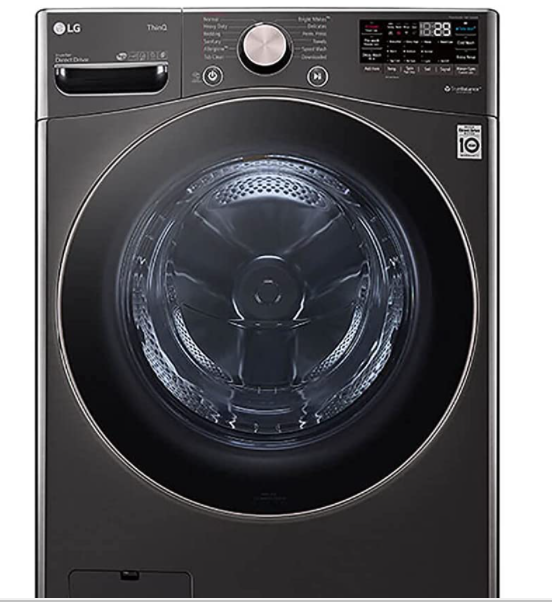How long does a washing machine take to wash clothes? Although the time it takes for each washing machine and load of laundry to complete the job will vary, there are some guidelines you can follow to help you estimate how long your washer will take to complete the job! These factors must be considered when determining how long it will take your washing machine to wash clothes.
How Much Time Should A Washing Machine Cycle Take?

When it comes to washing in a hurry, you are completely reliant on your washing machine’s quick wash function. However, unless it is an absolute emergency, many people will continue to use their standard wash cycles, but why do they seem to take so long?
Does this imply that the average cycle will take around 2 hours to complete? Does it have to take that long? In many cases, yes, unless you choose a shorter quick wash cycle; however, the time it takes your washer to complete a cycle can be manipulated in certain models.
The amount of water used and the amount of energy used to combine to make up the time of your wash cycle. Now, if you use more water in your wash cycle, your washing machine will use more energy as well.
While this will increase your costs, it will also shorten the time it takes to wash your clothes. Many washing machines allow you to adjust the amount of water/energy used during a wash, so if you want to speed up a cycle, you can.
Examine your washing machine’s manual to learn how to do this with your machine, but be aware that the energy costs can be high. There will also be limits to how much you can manipulate and change the washing time in this way.
Because of EU regulations, all washing machines must have at least an A energy rating (there are even higher A+ and A++ ratings), so there is only so much you can speed up your washing machine by using more water and energy.
As a result of the complexities and limitations, this method should not be relied on. In a pinch or desperate situation, it may be worth considering, but keep your energy bills in mind. So that leaves you with only one major option: the quick wash.
Time Required To Spend On Laundry

You’re doing laundry and realize you have too many clothes in the washing machine to leave it running while you run an errand or take care of something else. How much time will it take to wash your clothes? Here’s how long does a washing machine takes to wash clothes, depending on the type of machine and how full it is.
Laundry is the process of washing, drying, and folding clothing and other textiles. The laundry process can take anywhere from 0 minutes to hours per week depending on your living situation, access to machines, and financial situation. Here’s a basic breakdown of the laundry process, assuming a weekly laundry schedule of two loads.
1-Laundry Preparation Time
Laundry would be completed much more quickly if it were as simple as tossing dirty clothes into a washing machine. When it comes to cleaning your favorite t-shirt, it must first be placed in a hamper or bag. It can also take some time to gather your bedding and towels. Getting everything in one place (the laundry room) can be a time-consuming task. Total time per week: 30 minutes.
2- Laundry
This is entirely dependent on how filthy your clothes are. Most modern washing machines have a standard run time of 40 minutes, but if the soil level is high, it could take up to an hour. Total weekly time: 80 minutes.
3- Drying Period
A typical load of laundry takes between 30 and 45 minutes to complete. While some items, such as towels and jeans, take longer to dry, the majority of items dry in about 40 minutes. Total weekly time: 80 minutes.
4- Wrapping
Many people consider this stage to be the most difficult part of doing laundry. When your clothes are fresh out of the dryer, the last point users need to do is kind into them and fold them neatly. An average load of laundry takes about 20 minutes to fold. This will depend on the size of a truck full and one foldable speed. Weekly total time: 40 minutes.
5- Getting Rid Of
Everything is neatly folded, and you’re finished with the laundry. Right? Wrong! Instead of leaving folded piles of clothes out, return them to the drawer or closet from which they came. This vexing process usually only takes a couple of minutes, but it adds up over time. Total time per week: 10 minutes.
How Long Does A Washing Machine Cycle Take?
Washing machines can take anywhere from 15 minutes to two hours to complete a load. On average, a normal load will take about an hour to cycle through the washer. Larger or bulkier loads, such as towels or thick blankets, will take longer, whereas smaller loads, such as delicate, will take less.
This will, of course, differ depending on the size of your load and the settings on your washing machine. A timer at the top of most modern machines indicates how long you can expect your washing to take.
How to Make Your Cycles as Short as Possible
Understanding how to use and care for your washer is the most important thing you can do to ensure that your laundry is clean and that your washer lasts as long as possible! If you are unhappy with the length of your washing machine cycles, the first step is to consult the owner’s manual for your specific model. Some manuals will tell you if certain options lengthen a cycle or show you how many rinses a cycle or soil level setting has.
Overall, using too much detergent or not using detergent in a machine designed for it can cause cycle times to be extended. Furthermore, your clothes may appear dingier or even dirty at the end of a cycle, and residue in your washer can lead to odors and mold growth! Some washers, such as Whirlpool Load and Go, now include detergent reservoirs that automatically dispense the appropriate amount of detergent for the load. Otherwise, read the directions on your detergent carefully. Most loads require about a coffee scoop of detergent about two tablespoons.
Unbalanced loads can also cause cycle times to be extended. Overloading, combining heavy and light items, improperly leveled machines, or even underloading (though we don’t see this very often) can all cause this. When your washer detects an unbalanced load, it will pause the cycle to attempt to correct the problem. Top loaders will typically do this by filling the tub with water to redistribute the clothes, whereas front loaders will reduce the spinning speed and then attempt to spin back up to full speed. Loading your washer correctly will help to avoid this problem!
For A Quick Wash Cycle, Eschew These Cycles and Options
1-Cycles for Sanitation and Heavy Duty
Sanitize cycles are typically longer than 2 hours! Hot water is used in cycles such as “Whitest Whites” and other heavy-duty cycles more on that below. They may have extended the cycle’s “soaking” periods to allow detergent to penetrate the fabrics more deeply, as well as extended agitation and extra rinses. Cycles like these can easily last three hours.
2- Washes with Hot Water
Most mid-range washers now include an internal water heater to heat the wash water to the proper temperature for the cycle and any settings you’ve chosen. The washer may even pause the cycle to heat the water to the appropriate temperature. To reduce the workload on your washer, make sure your home’s water heater is set to 120 °F (and it can help with your dishwasher running too long, too). Aside from killing germs (which is beneficial when it comes to sheets, towels, cloth diapers, as well as other items), using more hot water will not enhance the cleaning performance of your detergent.
When you select a high soil level, your washer will typically fill, spin, and rinse the clothes more times than it would with a lower soil level. The heavy soil option should only be used for heavy soils; it is unlikely to get better wash performance on a typical load.
3- Optional extra rinses, prewashes, and soaks
Similar to the heavy soil alternative, prewashing, soaking, or adding an extra rinse should be reserved for items that require it. An additional rinse can add 10-15 minutes to the total cycle time. If you’re using the extra rinse option to remove white detergent streaks from your clothes, you’re probably using too much detergent or mixing thicker fabrics with lighter ones.
If you’ve ruled courses, prowess, there could be a problem with your washer’s load sense system, the water inlet valve, or something else.
If you despise waiting for your laundry to finish, consider a smart washer that can notify you when a cycle is finished via your smartphone! Many mid-priced washers also include digital time remaining readouts, which estimate how long the wash will take based on the options you choose and the size of the load.
Making sure you understand how to load your washer to avoid overloading and rebalancing will help ensure that all these time remaining readouts are accurate! Your washer may be able to predict when the cycle will begin, but it will not be able to predict whether the load would become unbalanced.
How About Fast-Washing Cycles?
Many mid-range and high-end washers include a quick cycle that can wash your clothes in 30 minutes or less. These cycles are designed for small, lightly soiled loads. Because they don’t clean as thoroughly as a full wash cycle, they’re not ideal for muddy gardening pants or a week’s worth of stinky gym clothes. Use the quick wash cycle as directed to get the best performance out of your washer.
Some brands have begun to place a greater emphasis on reducing cycle times. As an example:
LG’s Turbowash360 Technology
LG’s Turbowash360 Technology

The previous TurboWash3D 2.0 design’s 3.0 version employs several features to start reducing cycle times with a full-sized load. TurboWash combines the rinsing, spinning, and draining phases of the cycle to shorten wash times while maintaining cleaning power.
Conclusion
The answer to this question is how long does a washing machine take to wash clothes? Will be determined by a nuseveraltors, including the type of washing machine you use and the size of your load. In most cases, however, the process should not take more than 40 minutes from start to finish.
This washing machine guide will help you understand How long does a washing machine takes to wash clothes, what you can do to accelerate the process, and what you should do if your clothes aren’t completely clean when they come out of the washer.
Frequently Asked Questions
Q: Why is it that my washing machine takes 3 hours to complete a load?
A: A washer that consistently takes too long to wash may have a faulty load sense system or more serious issues with its control panel. There could also be problems with your water inlet valve, which draws water into the appliance during each cycle.
Q: Is it true that modern washing machines take longer?
A: Although modern machines generally take longer to complete than their predecessors, this does not imply that they should take all day. Cycle times of 3-4 hours may indicate a problem with the machine itself.
Q: Why do washing machine minutes seem to last so long?
A: At the end of the cycle, all washers spin as fast as they can. This is done to remove excess water from wet clothes. If the load sensor is activated again while your laundry is still wet, the spin cycle is extended. As a result, your ten minutes become twenty minutes.
